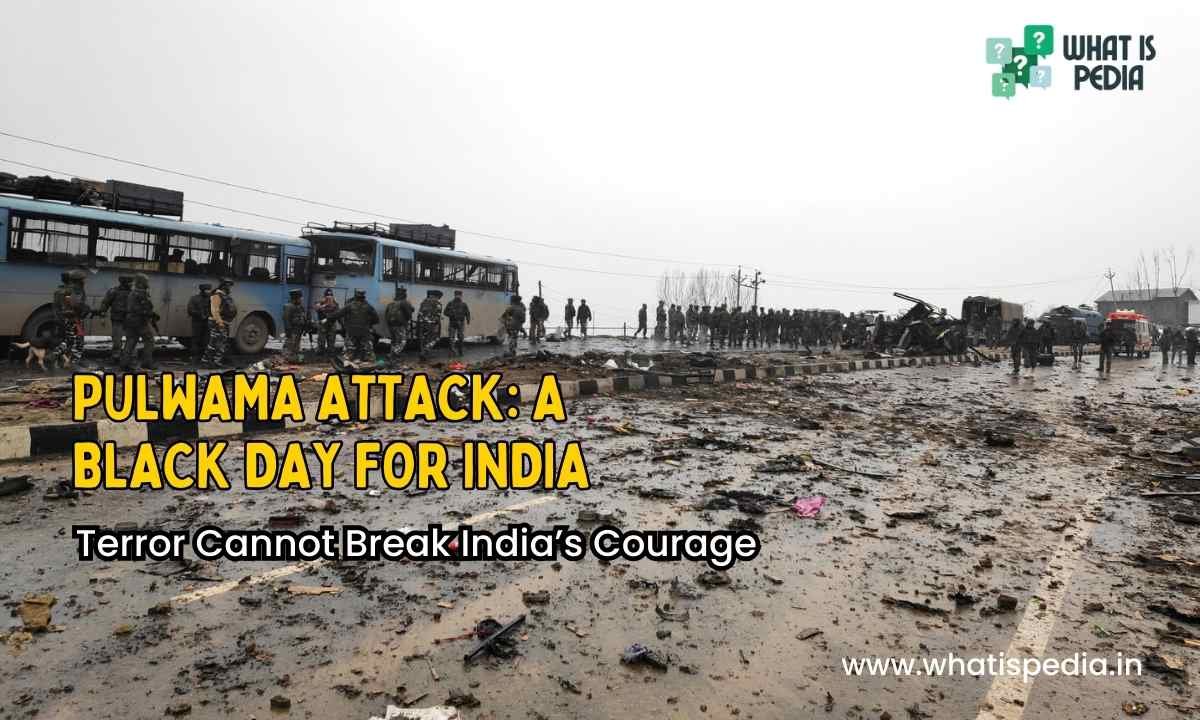Introduction
The Pulwama attack remains one of the most tragic incidents in India’s history. It took place on February 14, 2019, and shook the entire nation. A suicide bomber targeted a convoy of Central Reserve Police Force (CRPF) personnel, resulting in the loss of 40 brave soldiers. This horrifying incident not only intensified tensions between India and Pakistan but also strengthened India’s resolve against terrorism.
The Day of the Pulwama Attack
What Happened on February 14, 2019?
On this fateful day, a convoy carrying over 2,500 CRPF personnel was moving on National Highway 44 in Jammu and Kashmir. As the vehicles reached Lethpora in Pulwama, a Jaish-e-Mohammed (JeM) terrorist, Adil Ahmad Dar, rammed an SUV loaded with over 300 kg of explosives into one of the buses. The impact was devastating, leaving behind a scene of destruction and grief.
Immediate Aftermath
The explosion was so powerful that it reduced the bus to debris. The entire nation was in shock, mourning the loss of 40 CRPF jawans. As soon as the news broke, tributes poured in from all corners of India. Leaders, celebrities, and common citizens united to condemn the attack and express their support for the armed forces.
Who Was Behind the Pulwama Attack?
Jaish-e-Mohammed’s Involvement
The Pakistan-based terrorist group Jaish-e-Mohammed (JeM) claimed responsibility for the Pulwama attack. The group has been involved in several terrorist activities targeting India. The attacker, Adil Ahmad Dar, was a local youth who had joined JeM in 2018. His radicalization and subsequent actions raised serious concerns about terrorist recruitment in Kashmir.
Role of Pakistan
India strongly accused Pakistan of harboring and supporting terrorist groups like JeM. This claim was supported by various intelligence reports. In response, the Indian government took diplomatic steps to isolate Pakistan on the international stage.
India’s Response to the Pulwama Attack
Diplomatic Actions
India swiftly took steps to counter Pakistan’s alleged involvement in the Pulwama attack:
- Revoking Pakistan’s Most Favored Nation (MFN) status to limit trade benefits.
- Urging global organizations like the United Nations to blacklist JeM leader Masood Azhar.
- Pressuring international allies to cut ties with Pakistan-based terror groups.
Balakot Air Strikes: A Strong Message
What Happened in Balakot?
On February 26, 2019, the Indian Air Force (IAF) carried out a surgical strike in Balakot, Pakistan. The mission targeted JeM training camps and neutralized many terrorists. This marked a major shift in India’s counter-terrorism strategy.
Impact of the Strikes
- It demonstrated India’s zero-tolerance policy against terrorism.
- The airstrike sent a strong message that attacks on India would not go unpunished.
- It heightened tensions between India and Pakistan, leading to cross-border skirmishes.
The Nation’s Tribute to the Martyrs
Mourning and Condemnation
The entire nation stood in solidarity with the families of the 40 CRPF martyrs. Schools, offices, and organizations observed silence in their honor. Many people came forward to provide financial assistance to the families.
Government’s Support
The Indian government announced compensation and job support for the martyrs’ families. Several state governments also extended their help by offering financial aid and educational benefits to the children of the deceased soldiers.
Lessons from the Pulwama Attack
Need for Stronger Security Measures
The Pulwama attack exposed certain lapses in security arrangements. It led to significant changes in how convoys move in high-risk areas. More stringent security measures have been implemented to prevent such tragedies in the future.
Counter-Terrorism Strategies
India has intensified its counter-terrorism operations, ensuring that organizations linked to terrorist groups face strict action. The country also continues to work with global allies to counter terrorism at an international level.
Conclusion
The Pulwama attack was not just an assault on India’s security forces but an attack on the entire nation. It highlighted the need for stronger counter-terrorism policies and better security measures. While India paid a heavy price, the incident also strengthened national unity and resilience. The sacrifice of the 40 brave CRPF personnel will never be forgotten, and the nation continues to honor their memory by standing firm against terrorism.
At Whatispedia, we are committed to providing in-depth, well-researched answers to all ‘What is’ questions, ensuring clarity and knowledge for everyone.







